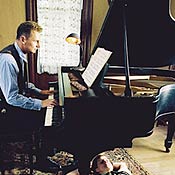
Liam Neeson has a gift for making exalted characters seem human, if fetchingly tall and rangy. Whether playing the Irish Rebellion firebrand Michael Collins, the martyred thief Jean Valjean, or the morally redeemed businessman Oskar Schindler, Neeson uses his perennially wounded-looking gaze to convey the tortured, high-minded ambivalence that floats above his sinewy broad shoulders.
So it takes something as powerful as sex, and a costume as commonplace as a lab coat, to shrivel Neeson a bit. As the title character in Kinsey, the dogged researcher into all the myriad ways we shake our groove things, Neeson comes off humbled, perplexed, yet at bottom (especially when it comes to bottoms) determined to suss out the truth. It’s a new Neeson as Dr. Alfred Kinsey, all spiky-haired and harried, and he’s enormously appealing in the role. You have no trouble believing this grave, earnest man could convince not just his wife (Laura Linney, looking like a freshly scrubbed fallen apple, an eager Eve in the Garden of Science), not just his students (including Chris O’Donnell and a pouty Peter Sarsgaard), and not just his college president (Oliver Platt, savoring his orotundities) that his research into rutting is valuable. The entire country, when Sexual Behavior in the Human Male was published in 1948, becomes enthralled, for a little while at least, with the novel facts and figures on human copulation that turn up as a result of Kinsey’s meticulous interviews with ordinary American folks. And then, of course, the public turns on him like the prigs we tend to become when we realize that we are “the folks” (“Henry, you don’t masturbate, do you?”), and pretty much destroy the poor devil.
Bill Condon is one of the few American writer-directors able to pull off the explicitness necessary in an honest portrait of Kinsey. As he proved in his previous, Oscar-winning biopic, 1998’s Gods and Monsters, about Frankenstein director James Whale’s infatuation with the hunk who trimmed his hedges, Condon can put sex on the screen and make it tingle without having its wattage jump into convulsive porn. His script briskly delivers the scientist’s revelations about everything from masturbation to what he discreetly calls “genital kissing”; Condon only occasionally stoops for a cheap laugh by showing us the shocked reaction of a Typical American (all the interviewees look like startled Norman Rockwell drawings). Neeson radiates the avid thrill of scientific discovery Kinsey takes in exploring sex in all its multitudinous practices, variations, and societal implications. Condon errs in making a rival professor who teaches abstinence such a twitchy loon (he’s played by Tim Curry in his latter-day sitcom mode). But the degrees of attraction and curiosity that flitted between Ian McKellen and Brendan Fraser in Gods and Monsters find their parallels here in Kinsey’s intellectual and physical involvement with Sarsgaard’s Clyde Martin. The bisexual Martin is irresistible to “Prok,” as the students called Professor Kinsey, who even enjoins Martin to add some three-way leeway to Kinsey’s marriage.
And this is where Kinsey wobbles as drama. The film would have us believe that while conducting rigorously sober scientific research, Kinsey’s lab-rat-pack was also engaged in a free-love spree, with mate-swapping the norm. That’s why it doesn’t surprise us—and doesn’t seem nearly as portentously tragic as Condon wants us to experience it—when Kinsey’s principal research funder, the Rockefeller Foundation, withdraws its support. Like Timothy Leary and his university-funded LSD experiments a generation later, Kinsey goes off the academic rails, preaching against government restrictions on sexual activities (“Morality disguised as fact,” he sneers), and dropping trou the way Leary dropped acid. The movie makes a point of the ever-sincere Alfred’s averring that, post-research, he and “Mac,” as he called his wife, often had sex three times a day. That’s nice, but it’s pretty obviously not the announcement of a wise scientist seeking tenure.
Thus the latter third of Kinsey—when we’re shown how his second study, on female sexuality, became the target of ludicrous but damaging congressional hearings somehow linking Prok’s findings to communism—takes on an inevitability that drags. The best scenes here involve Kinsey’s reuniting with his long-estranged father, a superbly uptight John Lithgow, only to have son abruptly conduct a sexual-history interview with dad. And in showing us the steady dissolution of Kinsey to a haggard man in his bathrobe, weeping at the loss of his power, Neeson’s imposing girth aids the subtlety of his acting once more. The god becomes a monster of misunderstood good intentions—a sad, pitiful, mortally weakened one.

The last time Laura Linney and Liam Neeson worked together, it was as a married couple far removed from the sexual radicals Clara McMillen and Alfred Kinsey: The pair played John and Elizabeth Proctor in Richard Eyre’s Broadway production of Arthur Miller’s The Crucible. “After The Crucible,” says Kinsey director Bill Condon, “Liam really keyed into the fact that Kinsey, having rejected religion, still had that preacher gene in him from his strict Methodist background—that he was still a preacherlike performer. And it was Linney’s joke that they were reinventing the Proctors for the twentieth century.”
Kinsey
Directed By Bill Condon.
Fox Searchlight. R.